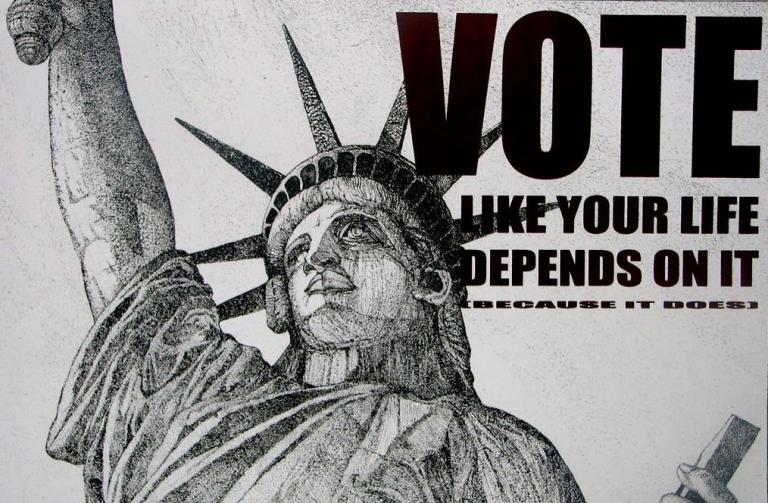
If Christians are ever to think independently about voting, we have to start thinking earlier than usual. So let’s get ahead of the conversation before the rest of the world makes up our minds for us.
This post has a limited purpose. I analyze two principled reasons why certain believers don’t vote in national elections. I argue that reasons grounded in personal purity are weaker than those grounded in missional impartiality. By “principled” I don’t mean “binding in all times and places.” I don’t subscribe to a timelessly right approach to voting. Rather, I mean convictions not tied to the specifics of a particular election, but linked to broader concerns.
I also limit my analysis to national elections. I’m not talking about local elections, company elections, or grade school elections for class treasurer. Though some ideas cross over, others do not.
Nor do I seek to convince Christians whether or not to vote. That would require a book length treatment. I’m simply exploring one aspect of a complex and sensitive conversation to get some Christian gears turning before it’s too late.
Recent developments among nonvoters
From a Christian perspective, the 2016 election season was unique. Of course, die hard democrats and republicans voted along party lines. Nothing new or interesting there. But enough Christians were leery of their usual party’s candidates that many were not certain how or even if they should vote.
This ambivalence amplified the voice of Christians who were thinking of not voting—many for the first time. For some it was due to the lack of a worthy candidate; for others it was a growing sense that voting in national elections isn’t something Christians should do.
According to one line of thought, the state is evil and participating in elections defiles its participants. Had they voted, they would have felt complicit in all the evil that would be perpetrated by their candidate. This logic aired recently on MSNBC’s Morning Joe program. Leftist pundit Donny Deutsch claimed that to vote for Trump is to “own” the “whole package.” And Deutsch insists that this means “you own the racism.”
In this example, the charge of complicity is aimed at conservatives. In my experience principled decisions not to vote are far more prevalent among theological progressives. And the left is starting to notice and to worry.
Of course, not voting or even voting for an independent will also subject you to the charge of complicity. To not vote or to vote for a sure loser often benefits the winning party. This means to many that you, too, must “own” whatever havoc the winners might wreak.
Still, abstaining altogether enabled some Christians to sleep with a clean conscience. That doesn’t mean they slept easily, however. Those who abstain from voting usually invite the scorn of numerous friends and family members. They regard voting as an American’s (read: human’s) most sacred political responsibility. And their biting and sometimes personal criticisms are often hard to shut out.
The Trump Effect
And then Trump happened. While principled abstainers boycotted election booths, less scrupulous Christians stormed polling stations and handed him a padded seat in the oval office. From the left’s perspective, Trump’s victory is one of the worst political developments in recent years (read: forever). And this has shifted the thinking of many progressives.
Politics now seems more complicated. Progressive Christians withdrawing from America’s electoral process amounts to handing the reins to conservative Christians with fewer qualms about complicity. The only responsible choice, then, is to suspend their principles and vote for the most worthy progressive candidate.
Thus the unwavering participation of most Evangelicals in the electoral process is now driving principled progressive abstainers back to the polls.
This leaves us back where we were before 2016 with progressive Christians lining up behind the political left and conservative Christians lining up behind the political right. Principled Christian opposition to voting is rapidly eroding and will likely crumble by 2020.
Up to this point, I’ve been reporting things as I see them unfolding. Now I weigh in with a bit of biblical reasoning.
The Problem with All or Nothing Logic
Donny Deutsch’s logic is dubious. Jesus and his followers didn’t champion “all or nothing” defilement standards. Modern partisans and ancient Pharisees used such binary thinking to manipulate “undecideds” into joining their ranks.
On the contrary, Jesus could give Caesar a coin without fear of being implicated in all the unjust executions it would underwrite. Paul could invoke Roman citizenship to escape premature execution and avail himself of the opportunity to preach in Rome. He was also willing to eat meat sold in the marketplace that was leftover from an idol feast without fear of contamination.
So if you are going to take a principled stance on voting, don’t do so on personal purity grounds. Such grounds are shaky from a biblical perspective and bypass careful Christian thinking. But that doesn’t mean there are no principled reasons why Christians might elect not to vote.
Kingdom Loyalty
A more relevant reason is that Christians have been baptized out of the kingdoms of this world and into the kingdom of God. We have but one king, Jesus, and we owe him our political loyalty. He has conferred upon us a full-orbed social-political agenda for this world. No biblical evidence suggests that it should be carried out in direct collaboration with the kingdoms of this world.
Collaboration with the empire was the Sadducees’ approach. They partnered with Roman rulers to negotiate freedom for Jews in Palestine. They were free to worship their own God as long as it didn’t interfere with Rome’s agenda. This enabled them to upsize and manage a magnificent temple in Jerusalem, complete with imperially-recognized religious officers. They achieved autonomy and authority to deal with in-house Jewish problems in specifically Jewish ways.
In short, the Sadducees accomplished for ancient Jews what many Americans value about the religious freedom we enjoy here. And Rome’s conditions were strikingly similar to those of America. Approved religionists may do whatever they want as long as it doesn’t step on the government’s toes. And, when asked, they must be willing to demonstrate allegiance to the empire.
First century Sadducean co-operators held political clout in Rome’s eyes and accomplished considerable good with it. But Jesus rejected their strategy and called his followers to follow suit. He decried the corruption of Jewish compromisers and anticipated the toppling of their central symbol: the glorious temple. As happened time and again, when Jewish allies were no longer useful, their pagan partners forsook them. By the end of the first century, the Romans had sacked Jerusalem and destroyed the temple for good.
But this wasn’t just the Sadducees’ fault. They weren’t the only Jews around. Other Jews branded the co-operators as sell-outs, staged protests against Rome, and hailed their own Jewish kings. Rebel factions rejected limited freedom under Rome and fought for complete autonomy. Still other Jews escaped the melee by hiding out in the wilderness.
The Sadducees had neither the strength nor the divine backing to hold it all together. The Jewish masses had a steadfast aversion to straddling two kingdoms. Such aversion manifested itself in a wide variety of ways. But it arose out of their weekly reading of sacred Scripture.
Eventually, Rome could no longer tolerate such an unwieldy people. They agreed with Jesus that one cannot serve two masters. So they chose Caesar, squashed the Jewish resistance, and demolished the temple. No one was spared—not the Sadducees, not the rebel zealots, not the pious Pharisees, and not even the separatists.
Missionary Impartiality
According to Jesus, this sorry state of affairs was God’s judgment on his people (Mark 13). They collectively missed the boat. And their wannabe captains—the Sadducees—simply couldn’t commandeer the helm. In all fairness, God’s people had been rocking this boat for a long time. They never fully accepted God alone as their true king. Nor had they heeded his instruction that their human rulers must never be like the nations’ kings.
Yet Jesus asked Israel to take a step further. He formed them into a transnational and transterritorial kingdom community—the church. They would have their own politics: God’s all-encompassing order for their shared life together. These pockets of kingdom citizens would not be tied to the kingdoms of this world. They had different agendas, different means, and different futures.
Instead they would be tied to other kingdom communities. Together they formed a worldwide network under one king and one social-political vision—God’s kingdom. They weathered the storms raging in their communities with the strength and solidarity of this global network and by the empowering presence of the Father, Son, and Holy Spirit.
This political posture is unique in world history and has endured over two millennia. But it is also quite precarious. Since God’s kingdom communities are not territory-governing entities, they always live as aliens and exiles. All of them occupy territories that are governed by others. These others will never govern according to God’s kingdom vision. For God has decreed that they will pass away and will eventually be replaced by his trans-territorial kingdom. God is not turning world kingdoms into his kingdom; he is replacing them with his kingdom (1 Cor 15:24-25).
This is self-evident to many Christians living as minorities in countries where their presence is not welcome. Yet it is nearly impossible to comprehend for Christians who live in countries more hospitable to Christian faith. That is why they often assume it is their responsibility to make the kingdoms of this world more like the kingdom of God. To them, ability = responsibility.
More recently, however, western Christians gave up the imperial ambition of converting other nations into God’s kingdom. Now they strive to give people a better life outside of God’s kingdom. While altruistic mission drift may be better than imperialistic mission drift, it’s mission drift nonetheless.
It is precisely this drift that sucks contemporary Christians into the diabolical discourse of political partisanship. Because we want a better life for our neighbors, we want rulers with the best available approaches in power. So we pick sides, or we gravitate toward news and entertainment outlets that prop up our preferred side. They then condition us to see reality and interpret Scripture through their lens.
What is worse, we begin thinking negative thoughts about Christians who voted for the other side. We begin to see them as an enemy whom we need not love. We rail against easy targets on social media and promote articles or soundbites that tear them down. Though we may frame it in Christianese, all appearances suggest that we’ve chosen sides. We appear to align with party A against party B.
Let me suggest a different posture more in line with God’s mission for his people. I call it respectful disentanglement. This means resisting the overwhelming urge to choose sides. It means denying the impulse to make the political pundits’ talking points our talking points. This requires tuning out the media spin of the left and the right. For each one consistently portrays their opposition in the worst possible light.
It also means, dare I say, not getting sucked into a burgeoning independent party. We already are, by baptism, an independent party. Our “party” need not turn a deaf ear to the plight of our hurting neighbors. For we are part of an innovative and powerful political order that enters their plight with good news of God’s kingdom and not the platforms of partisan politics. “Our weapons are not carnal, but mighty!” (2 Cor 10:4)
Deceptive Political Responsibility
An unpublished essay by John Howard Yoder deftly exposes how easily Christians get sucked into the schemes of worldly kingdoms:
The question is often posed as if it were the choice of a Christian whether or not to “accept” a political responsibility. This is a deceptive way of loading the question and moving the burden of proof. It happens only with extreme rarity that anyone is invited to take political responsibility. Normally this responsibility must be sought after, and at no slight effort. In North America, the procedure for seeking after major office is such that only the wealthy can make the attempt. A successful campaign implies lining up with a party, exchanging silence on some issues for support on others, and in other ways taking action for which “accepting responsibility” is a very deceptive euphemism; the only proper description is “seeking after political power.” (“The Evangelical Christian and Modern War,” 1993)
The analogy to voting here is only partial. When it comes to voting, the governing authorities want our vote. They ask for it, pay for it, and even shame us into it. They call it our most sacred civic responsibility. And they invite us to rise up and accept it. But responsibility may only be given by one who has authority to give it. The invitation to vote or otherwise serve world empires comes from the rulers of those empires.
That does not make it the responsibility of Christians. Our only allegiance is to God’s kingdom (Matt 6:33). We confess Christ alone as Lord. Indeed, the only responsibilities God gives us with regard to the kingdoms of this world is to pay taxes, pray for rulers (1 Tim 2:1-4), and refrain from rebelling against or overturning governing authorities though they perpetually rule unjustly (Rom 12:13-7).
Governing authorities stand under God’s jurisdiction. He holds them responsible for containing evil among fallen orders that are passing away. God holds them accountable for that and they are free to recruit their kind to help them do it. We, too, are under God’s jurisdiction, but our responsibility is different. God’s people have been set apart as a priestly nation to do what only our kind can do. We have been called to embrace, display, and proclaim God’s kingdom, which is replacing the old orders of this fallen world.
Nowhere in Scripture does God assign the government’s tasks to his church. Nowhere does he encourage the state to lay its responsibility upon Christians. This is why Yoder’s quote speaks so incisively to our time. By allying with political parties and platforms through voting (and all the seldom acknowledged hard work and energy that goes into discerning how best to vote), are Christians executing the sacred trust that God has given us, or are we still lustily seeking after political power?













